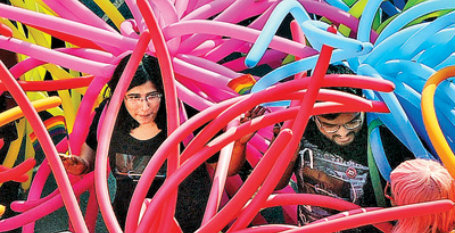About 5,000 people participated in the January 31 parade and a substantial chunk was formed by the parents who came to support their children and each other.
Parents of children from the LGBT community in India’s commercial capital came out in large numbers to participate in the Gay Pride March in Mumbai despite the country having strict anti-gay laws.
About 5,000 people participated in the Jan. 31 parade and “a substantial chunk was formed by the parents of members of the LGBTQ community, who came to support their children and each other” reports dnaindia.com.
"He's gay and I'm happy," father Pradip Divgikar, whose son Sushant represented India at the Mr Gay World competition last year told the newspaper.
Gay rights activist Vikram Doctor, who initiated the first Pride March in 2008 told dnaindia.com: “Earlier it would be only the occasional mother or sister or aunt who'd come join the gay person in the march. It's great to see fathers and brothers step forward too."
The parade had the trademark colorful costumes, rainbow flags and much singing but it also had “whacky, tongue-in-cheek banners and posters against the draconian section 377 of the Indian Penal Code,” the dnaindia.com reported.
Indian gay rights activists are also waging a legal battle to do away with the colonial-era “Section 377” law that describes same-sex relations as “unnatural” and punishable with life imprisonment.
Efforts have resulted in a flip-flop with courts decriminalizing and then recriminalizing the Section 377 law with the Supreme Court December 2013 upholding the validity of Section 377, reversing the 2009 Delhi’s high court ruling that decriminalized it and gave the gay community broad protections and rights. Currently, a new Supreme Court bench has agreed to re-examine that decision.
Same-sex relations is a contentious issue in socially conservative India where hugging, kissing and any form of public display of affection by even straight couples is strongly frowned upon. Gay people face stigma in India and same-sex relations are seen as a social taboo.
Gay rights activist Harish Iyer told dnaindia.com that the march is an attempt at building awareness. “There will be those who will point at us, but even they cannot negate their awareness of us as a community." Filmmaker Sridhar Rangayan said, "We want everyone to remember that this is not about sex or sexuality but about living with dignity as a human being.
The Mumbai gay pride parade first took place in 2008 with a call to abolish Section 377. Indian federal Minister of State told parliament recently that his government has no plans to amend Section 377 law criminalizing same-sex relations till the issue is settled by the Supreme Court.
Gay rights activists have always maintained that the law besides being discriminatory and unjust left the LGBT community open to harassment, persecution and prone to be preyed upon by both police and criminals.
Parents of children from the LGBT community in India’s commercial capital came out in large numbers to participate in the Gay Pride March in Mumbai despite the country having strict anti-gay laws.
About 5,000 people participated in the January 31 parade and “a substantial chunk was formed by the parents of members of the LGBTQ community, who came to support their children and each other” reports dnaindia.com.
"He's gay and I'm happy," father Pradip Divgikar, whose son Sushant represented India at the Mr Gay World competition last year told the newspaper.
Gay rights activist Vikram Doctor, who initiated the first Pride March in 2008 told dnaindia.com: “Earlier it would be only the occasional mother or sister or aunt who'd come join the gay person in the march. It's great to see fathers and brothers step forward too."
The parade had the trademark colorful costumes, rainbow flags and much singing but it also had “whacky, tongue-in-cheek banners and posters against the draconian section 377 of the Indian Penal Code,” the dnaindia.com reported.
Indian gay rights activists are also waging a legal battle to do away with the colonial-era “Section 377” law that describes same-sex relations as “unnatural” and punishable with life imprisonment.
Efforts have resulted in a flip-flop with courts decriminalizing and then recriminalizing the Section 377 law with the Supreme Court December 2013 upholding the validity of Section 377, reversing the 2009 Delhi’s high court ruling that decriminalized it and gave the gay community broad protections and rights. Currently, a new Supreme Court bench has agreed to re-examine that decision.
Same-sex relations is a contentious issue in socially conservative India where hugging, kissing and any form of public display of affection by even straight couples is strongly frowned upon. Gay people face stigma in India and same-sex relations are seen as a social taboo.
Gay rights activist Harish Iyer told dnaindia.com that the march is an attempt at building awareness. “There will be those who will point at us, but even they cannot negate their awareness of us as a community." Filmmaker Sridhar Rangayan said, "We want everyone to remember that this is not about sex or sexuality but about living with dignity as a human being.
The Mumbai gay pride parade first took place in 2008 with a call to abolish Section 377. Indian federal Minister of State told parliament recently that his government has no plans to amend Section 377 law criminalizing same-sex relations till the issue is settled by the Supreme Court.
Gay rights activists have always maintained that the law besides being discriminatory and unjust left the LGBT community open to harassment, persecution and prone to be preyed upon by both police and criminals.












 Printable Version
Printable Version



















Reader's Comments
Hello my dear,
i am happy to contact you after
viewing your profile and it interest
me to contact you for a genuine relationship,
please contact me here(nicolemakuza1992@hotmail.com)
so that i will share my feelings with
you for further communication.
Thanks, your friend Nicole.
(nicolemakuza1992@hotmail.com)
Please log in to use this feature.